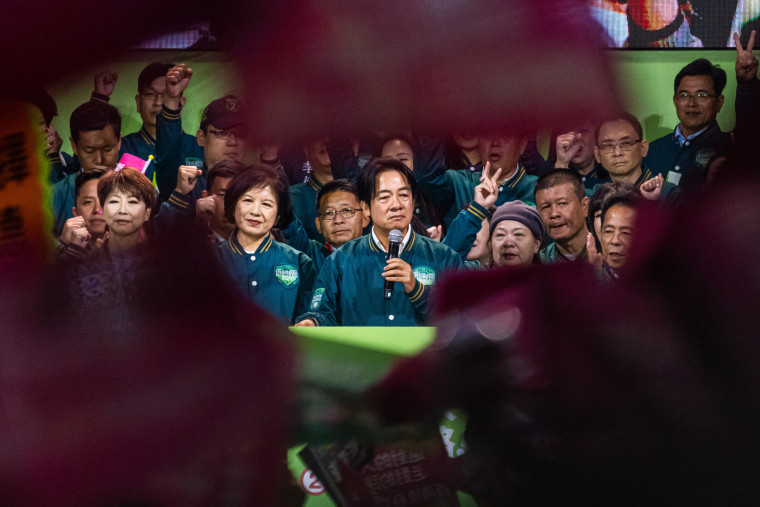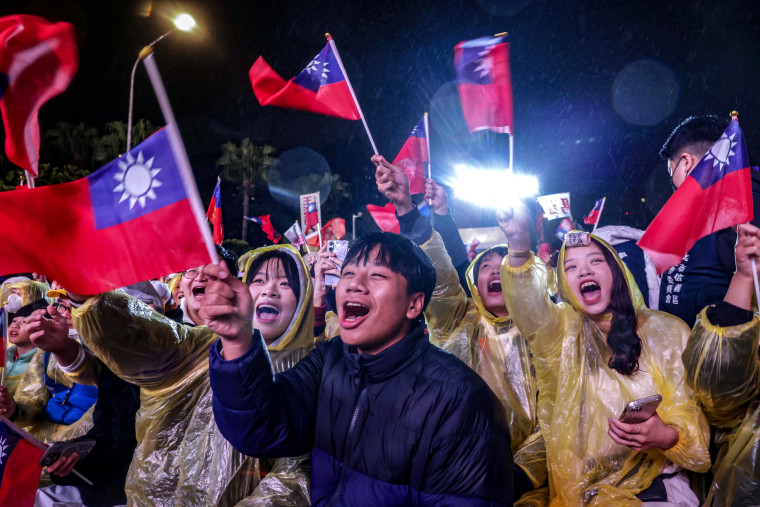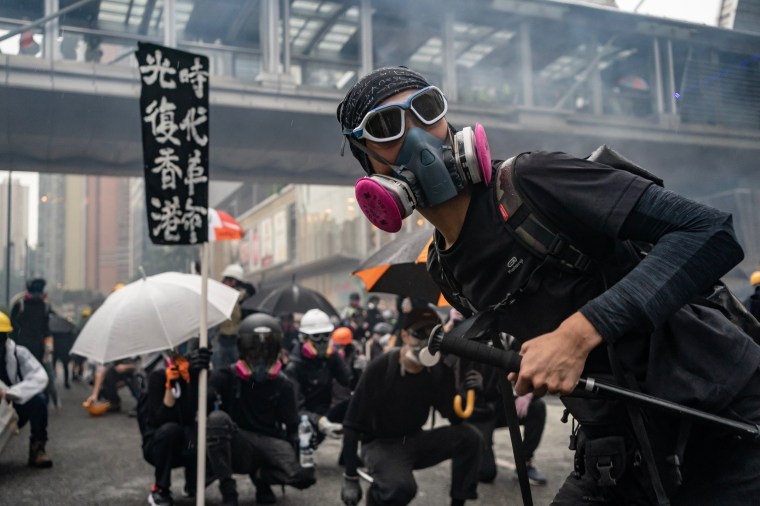HONG KONG — As Taiwan heads to the polls tomorrow in an election bound to shape its relationship with China, voters are being called to think of Hong Kong.
The Chinese territory, where critics say a crackdown on dissent after 2019 protests threatens cherished freedoms, has been cited as a cautionary tale by politicians and voters in Taiwan who say they could expect similar treatment from Beijing, which has not ruled out the use of force in unifying with the self-ruling island democracy it claims as its own.
Addressing voters last month, Taiwanese President Tsai Ing-wen pointed to Hong Kong as she dismissed China’s framing of the election as “a choice between war and peace.”
“Does anyone want war? Nobody does,” she said at a rally. “Look at Hong Kong and think of Taiwan. We don’t want Hong Kong-style peace. We want dignified peace.”
Tsai’s vice president, Lai Ching-te, the front-runner in the presidential race, criticized the crackdown in Hong Kong on Tuesday, saying that if China were successful in intervening in Taiwan, “Taiwan’s democracy will not exist.”
Rather than electing a president, Lai said, Taiwan would be “electing a chief executive, just like Hong Kong.”

Jaw Shaw-kong, the vice-presidential candidate for the opposition Kuomintang (KMT), which favors closer ties with Beijing, pointed to the internationally criticized national security trial of Hong Kong pro-democracy activist Jimmy Lai and the record-low turnout in Hong Kong’s “patriots only” District Council elections last month.
“If Beijing treats Hong Kong in this manner, the people in Taiwan are watching,” he told reporters yesterday.
All three presidential candidates — Lai, Hou Yu-ih of the KMT and Ko Wen-je of the Taiwan People’s Party — reject China’s offer of unification with Taiwan under the principle of “one country, two systems,” which Beijing says would provide the island a high degree of autonomy and is the same model used in Hong Kong.
Their comments on Hong Kong resonate with some voters.
“I would still be cautious in my voting choices when thinking of the lessons Hong Kong learned after 2019,” said Huang, a Taipei-based doctor, who wanted only his last name to be used for fear of being arrested for his comments “if Taiwan becomes a second Hong Kong.”
‘Last fortress’ of democracy
People in Taiwan, which rejects Beijing’s sovereignty claims, were captivated in 2019 by mass pro-democracy protests in Hong Kong that lasted for months and at times turned violent. Many noted that it reminded them of the stakes in Taiwan.
“Taiwan is the last fortress,” one Facebook user wrote in July 2019. “Freedom is not so easy to come by.”
Hong Kong was a “huge issue” in Taiwan’s 2020 election, said Shelley Rigger, a professor of East Asian politics at Davidson College in North Carolina, who was in Taiwan at the time. Tsai, who had faced rising momentum from the opposition KMT, brought it up frequently in her campaign for re-election and won in a landslide.
Beijing responded to the Hong Kong protests later that year by imposing a sweeping national security law criminalizing terrorism, secession, subversion and collusion with foreign forces, saying it was necessary to restore social order. Critics say the law has instead eroded the civil liberties that Hong Kong, a former British colony, was promised it could retain for 50 years when it returned to Chinese rule in 1997.
Since then, Hong Kong has only continued its reputational decline, falling to 88th out of 167 countries and territories in the Economist Intelligence Unit’s 2022 Democracy Index, compared with 75th in 2019. It has also struggled economically as international companies move employees or headquarters to rival financial hubs, such as Singapore.
Though most Taiwanese voters are more concerned this time around with their own economic issues than Hong Kong or anything else happening in China, Rigger said it was still a “background” factor.
“They’re reinforced in the perception that Taiwan should not allow itself to be influenced by Beijing,” she said.

A cascade of convictions
The news in Hong Kong is a constant churn of trials, verdicts and sentencings stemming from the protests almost five years ago.
Among the most prominent cases is that of Jimmy Lai, 76, the founder of now-defunct pro-democracy tabloid Apple Daily whose national security trial has been criticized as politically motivated. He is accused of acting against the Hong Kong and Chinese governments by conspiring to print seditious publications and colluding with foreign countries to call for sanctions.
Hong Kong and Chinese authorities say the case against Lai is being handled in accordance with the law and is not about press freedom. Lai, who has pleaded not guilty, faces possible life imprisonment if convicted.
A verdict is also expected in coming months in Hong Kong’s biggest national security case, involving 47 pro-democracy Hong Kong politicians and activists accused of plotting to overthrow the government through an unofficial legislative primary election in July 2020.

The defendants, who also face life imprisonment, say their actions were part of normal opposition politics under Hong Kong law. Most have been held without bail since 2021, and all but 16 have pleaded guilty, which could reduce their sentences.
Thousands of less high-profile people have been arrested, as well. On Wednesday, a 26-year-old Hong Kong man, Chu Kai-pong, was sentenced to three months in prison for wearing a T-shirt that said “Liberate Hong Kong, revolution of our times,” a slogan used by protesters in 2019 that has since been ruled a violation of the national security law.
Other pro-democracy figures have opted to leave Hong Kong, many of them going to Taiwan, though that has not stopped the Hong Kong government from pursuing them. Since July, the Hong Kong national security police have announced bounties of 1 million Hong Kong dollars ($128,000) each on 13 activists living overseas, including in the United States and Britain.
Last month, activist Agnes Chow, 27, said she would not return to Hong Kong from graduate studies in Canada, citing intense scrutiny from police since her release from prison in 2021 on charges related to the 2019 protests and her fear that she would not be allowed to leave Hong Kong again.
Also in December, Tony Chung, 22, the former leader of a Hong Kong pro-independence group who was released from prison in June, said continued police surveillance and mental health issues had compelled him to flee to Britain, where he is seeking political asylum.
Hong Kong authorities have condemned the two activists and vowed to bring them to justice.
The events in Hong Kong have permanently altered the way people in Taiwan view China and “not in a good way,” Rigger said.
“The deep feeling is that the crisis in Hong Kong in 2019 and 2020 proves that Beijing cannot be trusted to allow territories’ influences to be different from the sort of heartland of the PRC,” she said, using the initials for China’s formal name, the People’s Republic of China.
Huang, the Taipei doctor, said voters should consider which was more important to them, preserving their freedoms or avoiding conflict.
“At least we have freedom and democracy in Taiwan now,” he said.